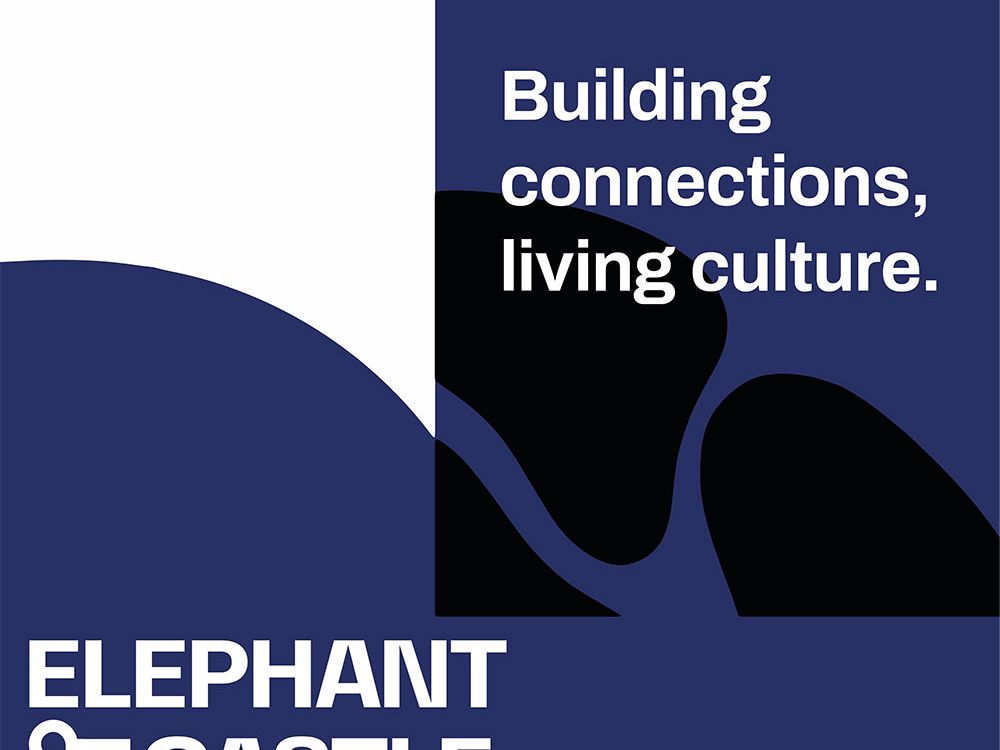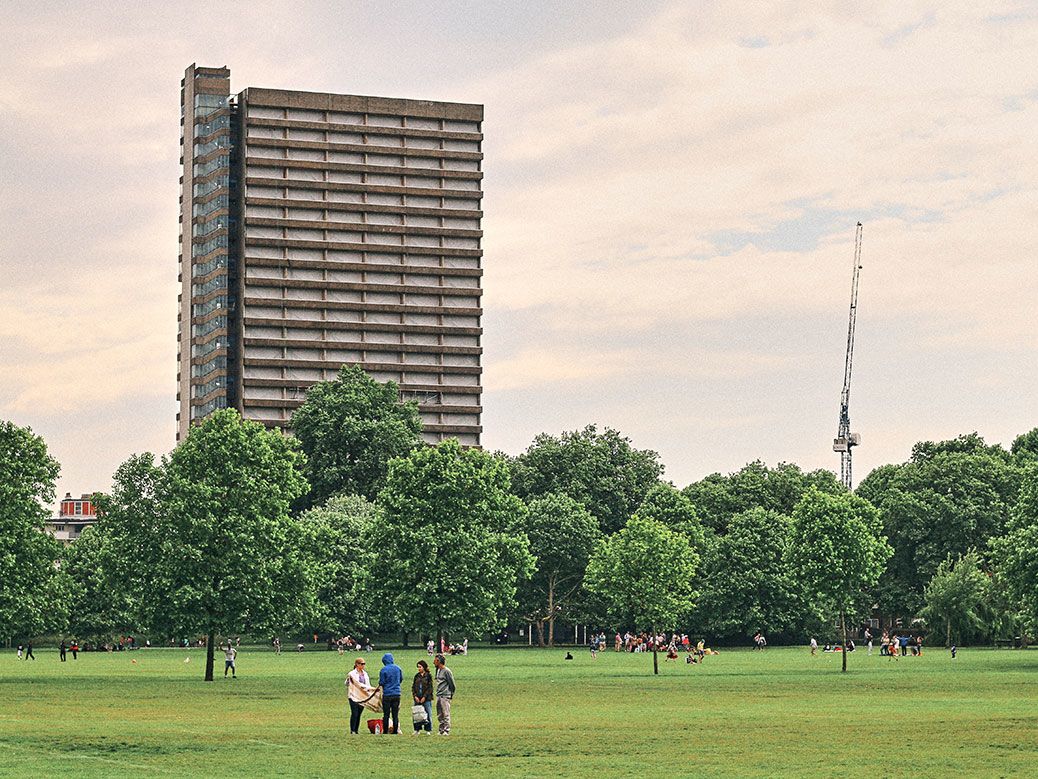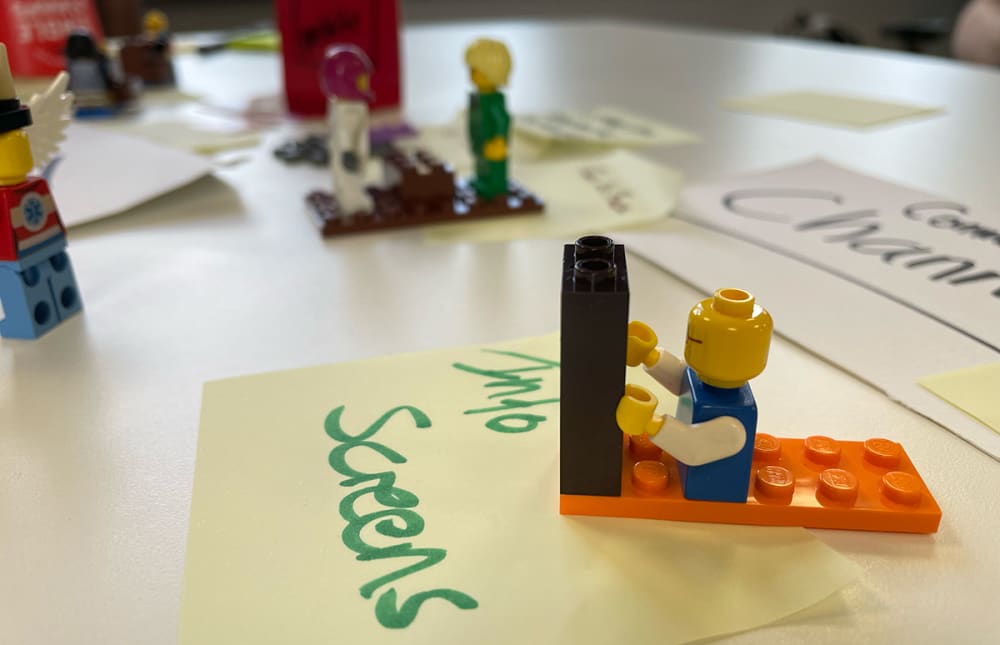
MA Service Design students develop tailored training programme to upskill university teams
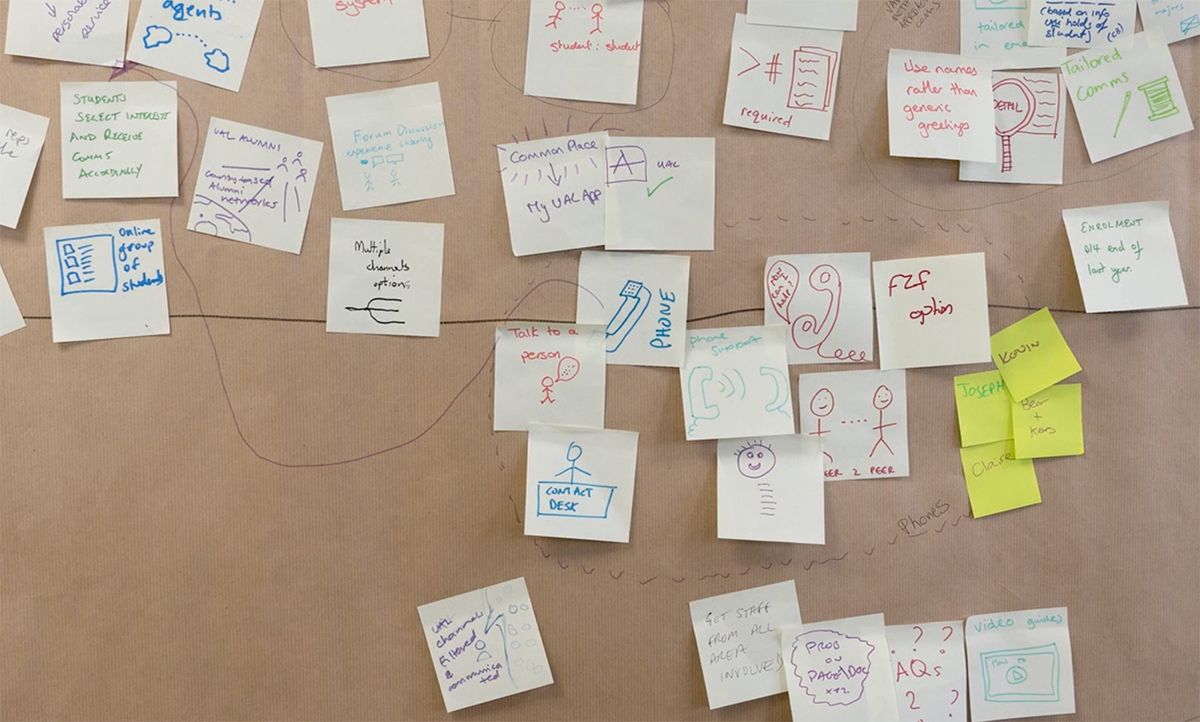
- Written byChloe Murphy
- Published date 31 January 2023

Creativity not only inspires and generates exciting work, but also helps us to configure new and exciting ways of thinking. This emphasis is key to the field of service design, which enhances the systems, actions and infrastructures that underpin individuals, communities and society.
As practitioners, service designers use core design principles to not only improve the quality of a service, but also the interaction between providers and users. As a result, they’re able to reconfigure the world around us through the systems we inhabit, and the ways in which we connect to both organisations and each other.
Recently, students on our MA Service Design course were given the opportunity to put their skills into practice by taking part in a project that aimed to support teams across University of the Arts London (UAL). Colleagues from Academic Development, Service Delivery and Course Support approached the Service Futures Lab at London College of Communication (LCC) to develop a programme that could upskill participants while delivering mindset change around ways of working – ultimately aiming to make the development of UAL’s IT Services more responsive and user-centred.
Using a range of innovative methods, approaches and processes, the Service Futures Lab developed a tailored training programme of co-creation designed around objectives such as catalysing culture shifts, demonstrating impact and enhancing resource capacity.
As a result, participants began to successfully apply the methodology learned on the programme to new initiatives, and adapted service design thinking to their own professional practice. They also reported feeling more confident in addressing the needs of their users, and observed that their team culture had already begun to shift positively while welcoming further change.
We chatted to 3 of the students involved in the development of the training programme, Yashwanthi Balamurugan Sumithra, Yin Zhou and Chalisa Intisarn, about working within the human-centred design space and the importance of activating learning through live projects.
Service Design Training Programme | MA Service Design
Tell us about your creative practice.
Yashwanthi: I come from a background in communication design, with a particular focus on branding and graphic design. Over the past 7 years, my creative journey has explored the experience of users when interacting with the things I create.
In parallel with how design is experienced, my focus has largely been on changemaking and both individual and social wellbeing, and so heavily reliant on design research and ethnography.
Yin: I'm interested in the space between society and business. By working between these two fields, I intend to create a greater, more long-lasting social impact.
Chalisa: I specialise in exploring human-centred design and the impact it creates for society.
I’m also passionate about research through design - discovering things through my practice, and doing ‘on-the-go’.
Why did you decide to study for an MA in Service Design?
Yashwanthi: While I identified my interest in experience design during my undergraduate studies, it wasn’t until the end of Year 4 that I worked on a project focusing on system design. This inspired me to begin exploring the areas of human-centred design, design innovation, and service design-related theories and projects after I'd graduated.
When I read about the MA Service Design course at LCC, I felt like it would be an excellent opportunity to develop my knowledge and practice in ways that could carry forward into a professional career across the human-centred design space.
Yin: In my previous experience, I discovered that all too frequently, social value isn't given enough attention in the business world, and that business value can sometimes be seen as too utilitarian in social organisations.
I chose to apply for an MA in Service Design as I hope my MA studies will help me better understand this situation, and empower me to improve it in the future.
Chalisa: Human-centred design has always been my interest, and I also enjoy practical projects, which is matched by the fact that our course curriculum is hands-on.
I hoped that studying on the MA would give me exposure to the design industry in the UK, and I feel it has also enabled me to explore the role of design in both the private and public sector as well.

How did you first find out about the project, and why did you decide to get involved?
Yashwanthi: Our tutor, Dr Silvia Grimaldi, made an open call to our MA Service Design cohort which discussed the programme and the aims it was trying to achieve.
It sounded like a great opportunity to put everything we'd learned over the last 8 months of the course into practice. It also took place just before the start of our Major Project, which seemed like a great time to further refine my skills in planning and facilitating workshops!
Overall, the project was indeed a wonderful, practical learning experience, and I’m so glad I got to participate.
Yin: After finding out about the initiative from Silvia, I jumped at the chance to take part as I felt it would be a great opportunity for me to work on a genuine project as a service designer.
Chalisa: I saw a post on our MA Slack group after one of our lecturers posted about the project. I decided to take part as I wanted to practice what I’d learned in the course while gaining some first-hand experience as a service designer.
What did your role in the project involve?
Yashwanthi: As Project Manager, my role involved communicating with the 20 participants before and after each session, sending out relevant materials, and coordinating between the team and the participants, along with general organisation and management work.
In my capacity as a service designer, I worked with 3 of my classmates and tutors to plan and facilitate the sessions with activities that aligned with session goals and the overall aims of the training programme.
Yin: In my role as a service designer, I assisted participants to create their own design principles, shared design knowledge, identified service gaps, and ultimately supported the team culture shift.
Chalisa: The core of my role as service designer was to facilitate the activities of our participants, along with preparing materials.
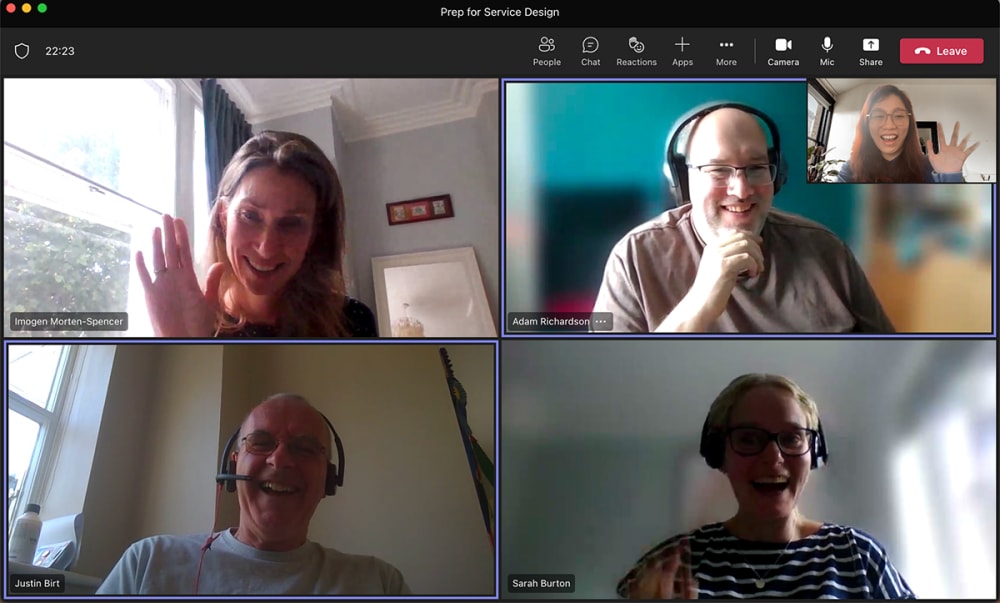
What were your highlights of the project?
Yashwanthi: It was a very hands-on learning experience, and I think were some specific highlights that, in hindsight, particularly stick out for me.
There were a few times when things didn’t always go according to plan, and we were able to improvise on the go (which felt like a real achievement!) Also, a few sessions in, the participants started reflecting on how they could put the ideas into practice in their daily jobs, which felt like a winning moment.
Additionally, being able to work alongside our tutors - from the planning and facilitating to post-session discussions - was another big highlight, personally.
Yin: There are 2 major highlights for me. On the one hand, I was able to work with a qualified team to finish a project, and to explore new perspectives around understanding and interpretation from the perspective of service design.
I also learned a tonne of new working techniques, and gained greater insight into the distinction between theory and practice.
On the other hand, I enjoyed observing the passion of the participants we worked with. I gained a deeper comprehension of the types of designs that are simple to implement, as well as the best methods of cooperation and communication - all of which has helped me to develop my own practice further.
Chalisa: I enjoyed being able to work closely with our lecturers as part of the same team, and being able to be on the facilitators’ side rather than the ones who are being facilitated. I also enjoyed getting to see how they planned their content, as well as being able to plan the sessions with them, which was definitely something new and interesting!
Moreover, another major highlight was being able to witness the service outcomes that our participants came up with, and to see how they will take those further.
How were you able to put the lessons you'd learned from your course into practice?
Yashwanthi: Being able to observe how MA Service Design tutors direct our classes, interact with us, and foster an environment of being able to think and work in a creative, curious, and very hands-on way helped me to put similar approaches into practice through the training programme.
Additionally, reflecting on the methods we use during our class projects – not only what worked, but what didn’t work – also helped when facilitating conversations and activities during the sessions.
Yin: Our main priority was to apply what we’d learned in the course to our work. We discussed a lot as a team, and also practiced certain workshops to ensure that the participants had a good experience.
Chalisa: Flipping from being facilitated by our lecturers to being facilitators ourselves, I was able to ask questions that would allow participants to discuss and create an environment of creativity, supporting them to come up with outcomes that will potentially be implemented.
We got to run through all the design process with participants that weren’t familiar with the process, which was a good way to activate our own learning.
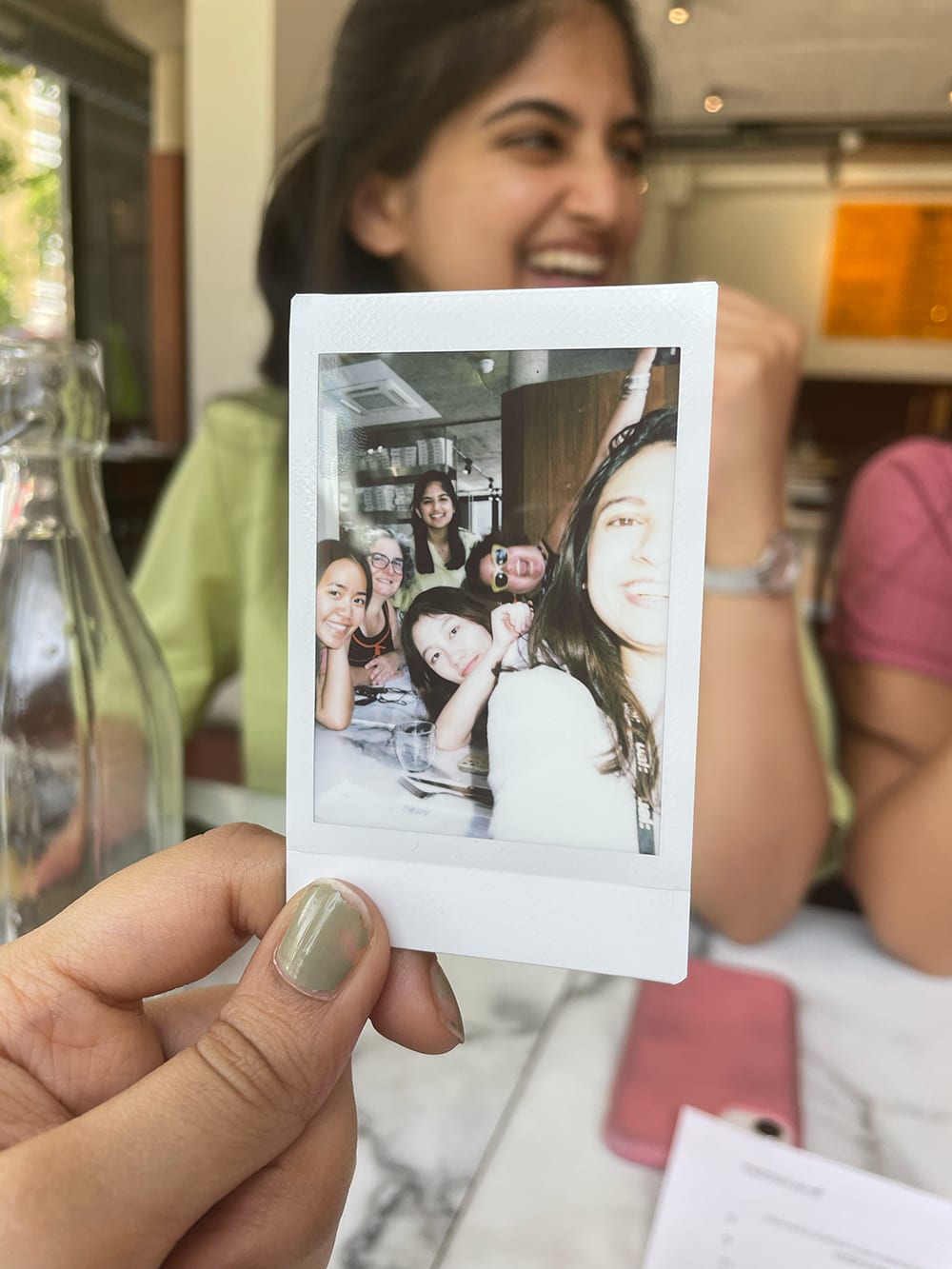
What have you most enjoyed about your time as an LCC student?
Yashwanthi: I’m grateful that our cohort got to have a lot of in-person classes and interaction with our tutors and classmates – that kept me engaged, enabled us to constantly learn from everyone, and also gave us time to get to know each other well.
My cohort really is an amazing bunch of people, and it’s been so inspiring to have tutors that bring different experiences and viewpoints to the mix.
I’ve really enjoyed the opportunities that constantly came my way to help me grow as a service designer, design thinker, and person.
Yin: This year, I was able to participate in 2 workshops, as well as enrolling in the Industry Mentoring Programme, which gives me the impression that the College seriously considers my interests and future goals.
Chalisa: All of our classes are hands-on, and the projects we’ve worked on have focused on social impact. I also enjoy the guidance and activities that we have at LCC, such as Academic Support.
What tips would you give to prospective students who are interested in service design?
Yashwanthi: From a place of personal reflection, I think that service design often seems like a lot because it spans a lot of things and cuts across many fields of work. Sometimes, this can feel a bit overwhelming – like there are too many skills to hone and lots to learn in a short period of time. But I’d also say that there’s an advantage to this as most of the opportunities or skills will be worth working on as they’ll probably come of use at some point in your practice or process.
So, my tip would be to constantly expand your knowledge in anything you might be interested in, and to take up opportunities when you can. Keep learning more about service design process and practice, and find ways to integrate your learning and experiences into what you deliver through service design as a framework.
Yin: Most of all, I appreciate the social responsibility demonstrated by the cross-disciplinary field of service design, and I chose to study service design at LCC because it aligns well with my values.
I’d advise taking extra time to consider your personality and the subjects you want to explore when deciding the course you wish to study.
Chalisa: Make the most out of all the activities and support there are at LCC and UAL.
Join events that will allow you to know people from different programmes, and also reach out to lecturers as they’re more than happy to support you when you need some advice.
Related links:
- Read more about the work of our MA Service Design students on MyBlog.
- Explore MA Service Design at London College of Communication.
- Learn more about our Design School.


